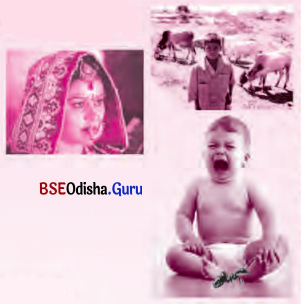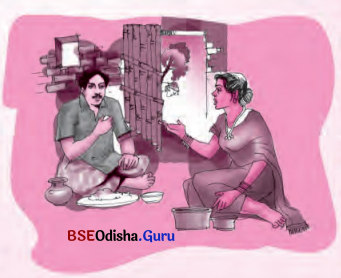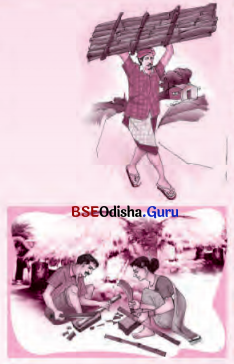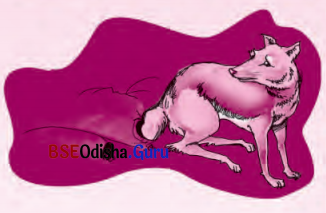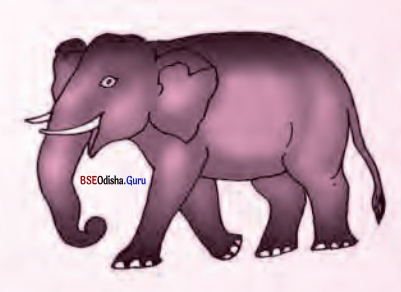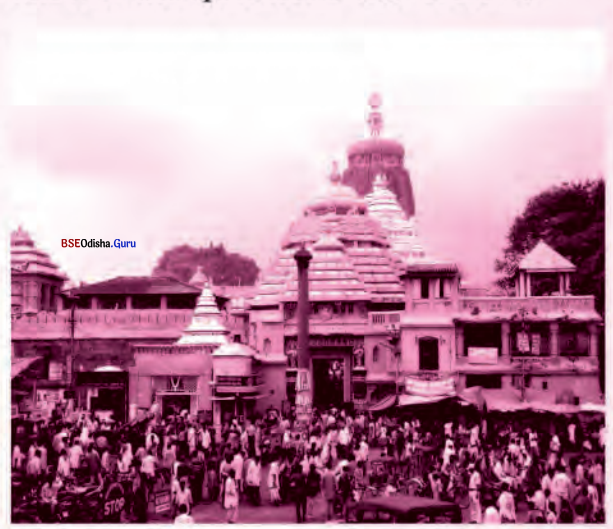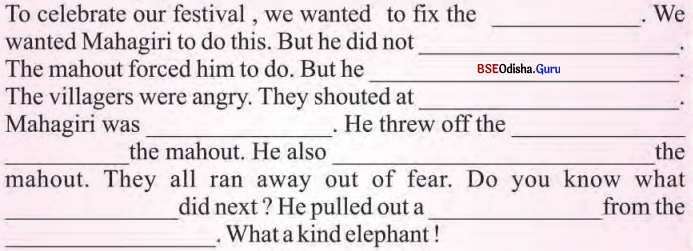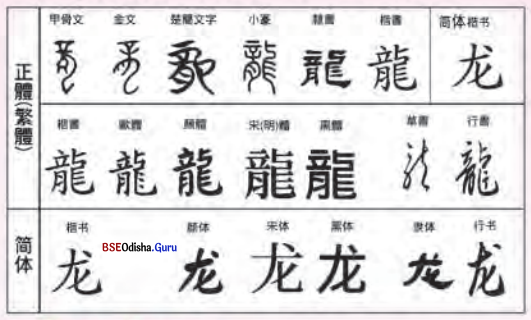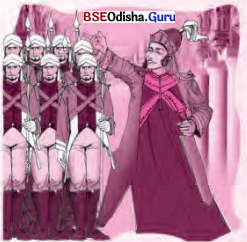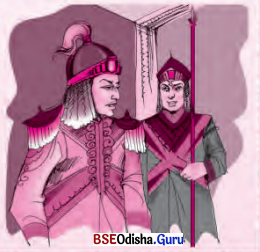Odisha State Board BSE Odisha 6th Class English Solutions Test-2 Textbook Exercise Questions and Answers.
BSE Odisha Class 6 English Solutions Test-2
BSE Odisha 6th Class English Test-2 Text Book Questions and Answers
1. Your teacher will dictate twelve words. Listen to him/her and write.

Answer:
| Elephant |
Trainer |
School |
| Circus |
Tamilnadu |
Susarcane |
| Cinema |
Kaveri |
Praise |
| Banana |
Mountain |
Punishment |
2. Given below are some words. Your teacher will read aloud seven of them. Tick those s/he reads aloud.
soldier, detective, village, deaf, temper, language, script, chase, curse, hate, mountain, valley, banana, merchant
[Listen to your teacher carefully and tick those words as he reads aloud.]
3. Your teacher will read aloud a paragraph. Listen to him/her and fill in the gaps. (Question with Answer)
”Tamilnadu is a beautiful state. It has beautiful mountain ranges and there are many rivers. Some of these rivers flow through the valleys. This makes all the places all the more beautiful.

4. Write the following names of persons in English.
(Teacher will provide names of six persons in Odia.)
ଅବଦୁଲ କାଲାସ
ରାସା ଲକ୍ଷ୍ମୀବାଇ |
ସ୍|ମୀ ବିବେକାନନ୍ଦ
ଯଯାତି କେଶରୀ
କ୍ରିପାସିନ୍ଧୁ ଦାସ
ବାଜି ରାଉତ
Answer:
Abdul Kalairi
Rani Laxmibai
Swami Vevekananda
Jajati Keshari
Krupasindhu Dash
Baji Rout
5. Write the following names of places in English.
(Teacher will provide names of six places in Odia.)
ବଦ୍ରିନାଥ |
ଜାମ୍ମୁ କାଶ୍ମୀର
ମିଜୋରାମ |
ଆଗ୍ରା
ଦିଲ୍ଲୀ
କନ୍ୟାକୁମାରୀ
Answer:
Badrinath
Jammu-Kashmir
Mizoram
Agra
Delhi
Kanvakumari
6. Match the words which sound alike at the end. (Question with Answer)
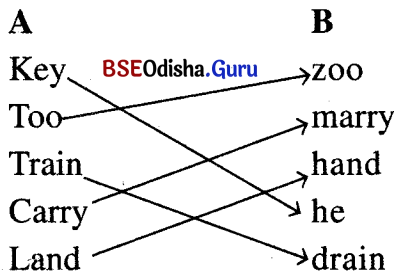
Answer:
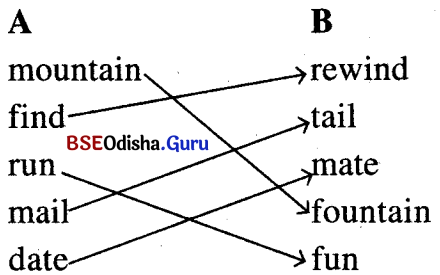

7. Read the poem and answer the questions in complete sentences.
I’d like to be a driver
Of an express diesel train
Or be a light-house keeper
Where do I want it and when?
For the more one lives
The more one learns.
I think I’ll be all these things
And go on taking turns.
Question (a).
What does the poet/child want to be?
Answer:
The poet/child wants to be a driver.
Question (b).
What does he want to drive?
Answer:
He wants to drive an express diesel train.
Question (c).
What does a light-house keeper do?
Answer:
A light-house keeper wants to watch any place and any time he wishes.
Question (d).
Does the child/poet want to take up one or more jobs?
Answer:
No, the child/poet does not want to take up one job, rather he wants to take up more jobs one after another.
Question (e).
How can one learn more?
Answer:
One can learn more by living more time in life.
Question (f).
What do you want to be? Why?
Answer:
I want to be a train driver. Because I can help many people to travel and carry their things to distant places.

8. Read the paragraph and answer the questions in complete sentences.
Once there lived a poor man in a village. He had a rich classmate. He lived in a town. They did not meet for a long time. In the meantime, the rich friend had problems with his ear and became deaf. This was not known to his friend in the village. The rich friend came to know that his friend was seriously ill. So he decided to visit him.
Question (a).
Where did the poor friend live?
Answer:
The poor friend lived in a village.
Question (b).
Where did the rich friend live?
Answer:
The rich friend lived in a town.
Question (c).
Who became deaf?
Answer:
The rich friend became deaf.
Question (d).
Did the poor friend know this?
Answer:
No, the poor friend did not know this.
Question (e).
What did the rich friend come to know?
Answer:
The rich friend came to know that his friend was seriously ill.
Question (f).
What did he decide to do?
Answer:
He decided to visit him.

9. Read the following poem and answer the questions in complete sentences.
Run in the raindrops
Run beneath the trees.
Run little races
With each little breeze.
Run down the hillside.
Run up the lane.
Run through the meadow
Then run back again.
Question (a).
What is the poem about?
Answer:
The poem is about the run.
Question (b).
How many stanzas are there in this poem?
Answer:
There are four stanzas in this poem.
Question (c).
Where does the poet/child want to run in the first stanza?
Answer:
In the first stanza, the poet/child wants to run in the raindrops beneath the trees.
Question (d).
Where does the poet/child want to run in the second stanza?
Answer:
In the second stanza, the poet/child wants to run little races with each little breeze.
Question (e).
How many times ‘run’ is used in this poem?
Answer:
‘Run’ is used seven times in this poem.
Question (f).
Who does the poet run races with?
Answer:
The poet runs races with each little breeze.

10. Read the following paragraph and answer the questions in complete sentences.
Three bears lived in a house near a wood. There was Papa Bear, a great huge bear. There was Mama Bear, a middle-sized bear. And there was Baby Bear, a small bear. One day they went out for a short walk in the wood. Mama Bear had cooked porridge for breakfast. She left the porridge to cool.
Question (a).
Where did the bears live?
Answer:
The bears lived in a house.
Question (b).
Where was their house?
Answer:
Their house was near a wood.
Question (c).
How many bears were there?
Answer:
There were three bears.
Question (d).
Who was a middle-sized bear?
Answer:
Mama Bear was a middle-sized bear.
Question (e).
Who was the biggest of all?
Answer:
Papa Bear was the biggest of all.
Question (f).
Who was the smallest of all?
Answer:
Baby Bear was the smallest of all.
Question (g).
Where did they go one day?
Answer:
One day they went to the wood.
Question (h).
Why did they go out to the wood?
Answer:
They went out to the wood for a short walk in the wood.
Question (i).
What did Mama Bear, a cook?
Answer:
Mama Bear cooked porridge.

Question (j).
Why did she leave the porridge at home?
Answer:
She left the porridge at home to cool for breakfast.


